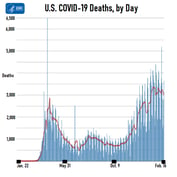What You Need to Know
- Hasbro says it's getting rid of the card for winning a beauty contest.
- It's also getting rid of the card for life insurance maturing.
- The pandemic has another message: Financial preparedness matters.
Many families will remember gathering for rousing — and sometimes seemingly endless — games of Monopoly. From being the first to stake a claim on Park Place to reaping the gains of an unexpected windfall from the Community Chest, people of all ages have been exposed to Monopoly’s model for asset accumulation for more than 85 years. In early 2021, Monopoly’s parent, Hasbro, announced that it would update the Community Chest cards to better reflect the ways in which the meaning of community has changed. Hasbro will do away with cards such as winning second place in a beauty contest and life insurance maturing.
While some fans of the game will likely be thrilled to say goodbye to beauty contests, they shouldn’t be so quick to dismiss the heart of a sound financial strategy.
In a game like Monopoly, young players learn about saving, investing and risk — and adults have the chance to talk with them about how these different elements of the game may play out in real life. By removing life insurance from the game entirely, players miss out on an opportunity to learn about how life insurance can be an important part of an overall financial strategy and help people plan for a more certain future.
At its core, life insurance is protection — a hedge against the unexpected. A death benefit from a life insurance policy can replace income from the loss of a breadwinner, ensure a family can stay in their home, fund educational expenses and so much more. Although Monopoly positions life insurance as almost an afterthought, constructing a long-term financial strategy with protection at the core is critical.
Beginning with a protection-first approach essentially takes risk off the table. As families prepare for the future, they should consider the benefits of planning for a sudden loss. By doing so, families can begin to think much more expansively about their financial futures and their mindset can shift from “what will they do if something happens to me?” to “how can we grow our wealth and leave something for the next generation?”









 April 23, 2021 at 01:27 PM
April 23, 2021 at 01:27 PM












